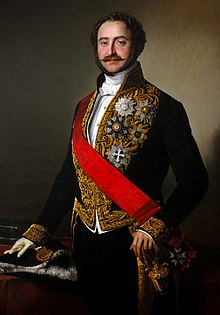Antoine Alfred Agénor de Gramont
Antoine Alfred Agénor , Duke de Gramont (born August 14, 1819 in Paris ; † January 17, 1880 ibid) was a French diplomat , most recently with the rank of ambassador. As Foreign Minister in the cabinet of Émile Ollivier in 1870 he was one of the people involved in the run-up to the Franco-Prussian War .
Career
Gramont came from one of the noblest families of the old nobility, the younger line of the Viscounts of Aure , who derived their name from their ancestral seat Gramont in Navarre . His grandfather, Duke Antoine Louis Marie de Gramont (1755-1836), had emigrated during the revolution, and his father, Duke Antoine Heraclius Genevieve Agenor de Gramont and Guiche (1789-1855), had on British side at the Spanish War of Independence participated, was In 1823 he joined the French army as a lieutenant general and in 1830 accompanied the abdicated King Charles X into exile in Scotland . The younger generation, on the other hand, was Bonapartist ; Gramont's cousin, Count Antoine Louis Raymond von Gramont (1787–1825), achieved rank and name in Napoléon Bonaparte's army.
Gramont owed his career to his early friendship with Napoléon III. After training at the École polytechnique , he entered the service of the Ministry of Foreign Affairs . His career developed after Napoléon's coup d'état on December 2, 1851, with which his friend gained dictatorial powers. The new government sent him as plenipotentiary to Kassel and Stuttgart as well as to Turin (1853), as ambassador to Rome to the Holy See (1857) and to Vienna (1861). After a conservative cabinet reshuffle in April / May 1870, he was appointed Foreign Minister in Émile Ollivier's cabinet on May 15. As such, he was mainly, but not entirely, responsible for the unsuccessful conduct of French negotiations in the conflict with Prussia over the Spanish succession to the throne, which led to the catastrophe of the Franco-German War (1870–1871).
Gramont was one of the 85 survivors of the sinking of the American ocean liner Arctic at Cape Race (Newfoundland) in September 1854 , killing 350 people.
Gramont's scroll 1870
The extent to which Gramont was to blame for the war was controversial. In his apology L'empire liberal , Ollivier describes the events firsthand. The well-known declaration, which Gramont read in front of the Chamber on July 6, and which more or less openly threatened war against Prussia, was therefore a joint effort by the entire Cabinet. The Ministers found Gramont's original draft too vague and weak; the reference to a revival of the old empire of Charles V was Ollivier's proposal; the declaration that France would not allow a foreign power to shift the European balance to its disadvantage came from the emperor. So as far as the Chamber Declaration is concerned, Gramont's cabinet colleagues and the Sovereign were equally responsible.
On the other hand, it is clear that Gramont did not strive for an "honorable peace" with the same "enthusiasm" as his colleagues, and also that he completely misjudged the reactions of the other European powers to a French declaration of war. He counted on Austria-Hungary for assistance because - according to Ollivier - he had been in the aristocratic society of Vienna for nine years, where since 1866 the demand for " revenge for Sadowa " - i.e. retaliation for the defeat against Prussia in the German war - was made Common property. Because of this confidence, he was less inclined than his colleagues to be satisfied with the withdrawal of the Hohenzollern candidacy for the Spanish throne and to make the best of the situation. On the evening of July 12th, Gramont presented the dubious circumstances of the Hohenzollern retreat to the emperor and that same night instructed the French ambassador to Prussia, Vincent Benedetti , to demand from King Wilhelm I an indefinite waiver guarantee by the Hohenzollern.
Ultimate responsibility, according to Ollivier's account, must be ascribed to the emperor, who "in the exercise of personal power placed it on the only one of his ministers who was prepared to neglect parliamentary safeguards in this way". Gramont himself "had no understanding of the requirements of the parliamentary system; he remained an ambassador who, as usual, obeyed the orders of his sovereign; he did not understand, with all the goodwill, that this was wrong and that he himself was parliamentary minister participated in an act destructive to the authority of Parliament ". Ollivier also writes: "The cause for him was obedience, not deliberate striving for war". From the point of view of France and the rest of the world, it was Gramont who was responsible for the policy with which France behaved injustice in the eyes of the European powers and which enabled Bismarck to give France that "blow" with the publication of the Emser dispatch in the face "( soufflet ), as Gramont put it in front of the chamber, which immediately led to the French declaration of war.
Further life
After the defeat at Weißenburg on August 4, 1870, Gramont resigned on August 9, along with the other ministers of the Ollivier Ministry. After the revolution in September 1870 he went to England. After the war he returned to Paris, where he died in 1880. He was married to Emma Mary Mackinnon (1811-1891), a Scottish woman, since December 27, 1848. In retirement he published various apologies for his politics from 1870, namely La France et la Prusse avant la guerre (Paris, 1872).
Web links
| personal data | |
|---|---|
| SURNAME | Gramont, Antoine Alfred Agénor de |
| ALTERNATIVE NAMES | Gramont, Antoine Alfred Agénor Herzog de (full name) |
| BRIEF DESCRIPTION | French diplomat and foreign minister |
| DATE OF BIRTH | August 14, 1819 |
| PLACE OF BIRTH | Paris |
| DATE OF DEATH | January 17, 1880 |
| Place of death | Paris |

